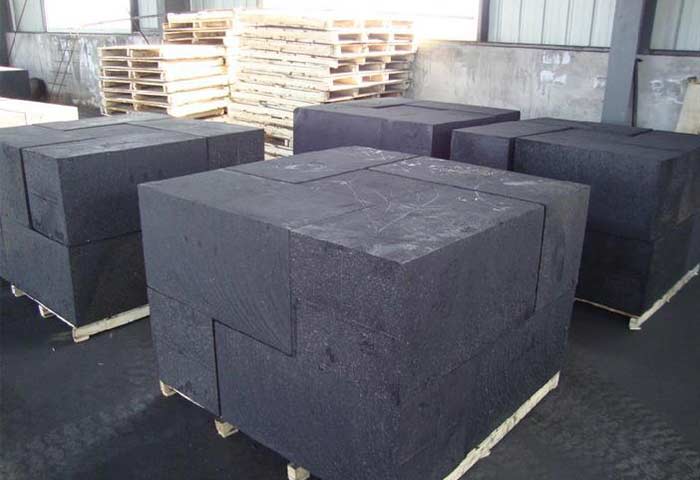
Carbon bricks are refractory bricks made from a mixture of high-quality graphite and clay. They are known for their exceptional high-temperature resistance and are widely used in various industries that require resistance to high temperatures, such as steel, cement, glass, and non-ferrous metal industries.
Carbon bricks have excellent thermal conductivity, low thermal expansion, and excellent chemical resistance, making them ideal for use in extreme environments.
PER refractories company has a large inventory of high quality carbon refractory bricks. Contact us today for a better price on carbon bricks.
Graphite bricks are carbon bricks made of high-purity graphite, which has a crystalline structure that provides excellent thermal conductivity and resistance to thermal shock.
Graphite bricks are commonly used in the steel industry, where they are used to line the walls of blast furnaces, electric arc furnaces, and ladles.
Carbon bricks are made of a mixture of high-quality graphite and clay.
They have excellent thermal conductivity and resistance to thermal shock, making them ideal for use in applications that require high-temperature resistance.
Carbon bricks are commonly used in the cement and glass industries, where they are used to line furnaces and kilns.
Silicon carbide bricks are carbon bricks made of silicon carbide, a compound of silicon and carbon.
They have excellent thermal conductivity, low thermal expansion, and excellent chemical resistance.
Silicon carbide bricks are commonly used in the non-ferrous metal industry, where they are used to line the walls of smelting furnaces and crucibles.
Magnesia carbon bricks are carbon bricks made of magnesia and graphite.
They have excellent thermal conductivity and resistance to thermal shock, making them ideal for use in applications that require high-temperature resistance.
Magnesia carbon bricks are commonly used in the steel industry, where they are used to line the walls of ladles and converters.
1. Steel Industry
Carbon bricks are widely used in the steel industry, where they are used to line the walls of blast furnaces, electric arc furnaces, and ladles.
The high-temperature resistance of carbon bricks makes them ideal for use in these applications, where temperatures can exceed 2,000°C.
2. Cement Industry
Carbon bricks are used in the cement industry, where they are used to line furnaces and kilns.
The high-temperature resistance of carbon bricks makes them ideal for use in these applications, where temperatures can exceed 1,500°C.
3. Glass Industry
Carbon bricks are used in the glass industry, where they are used to line furnaces and kilns.
The high-temperature resistance of carbon bricks makes them ideal for use in these applications, where temperatures can exceed 1,600°C.
4. Non-Ferrous Metal Industry
Carbon bricks are used in the non-ferrous metal industry, where they are used to line the walls of smelting furnaces and crucibles.
Silicon carbide bricks, in particular, are commonly used in this industry due to their excellent chemical resistance.
PER Refractories Company is located in Xinmi City, Henan Province, the hometown of refractory materials in China. Our company is a technology-based refractory enterprise integrating R&D, production, sales, and technical service. The rich resources and excellent quality in the territory provide unparalleled superior conditions for the production of refractory materials. Our main products are refractory clay bricks, high alumina refractory bricks, refractory silica bricks, magnesium refractory bricks, mullite bricks, insulating bricks, and other high-temperature-resistant products.
Company PER refractory is the production base of green, energy-saving, and environment-friendly new refractory materials. Our company has passed ISO9001:2008 international quality system certification and GB/T24001-2004 / ISO14001:2004 environmental management system certification, enterprise-quality inspection agency certification. Our products are sold well in more than 20 countries all over the world. They are the preferred refractory products for metallurgy, non-ferrous, petrochemical, glass, ceramics, and other refractory industries.
